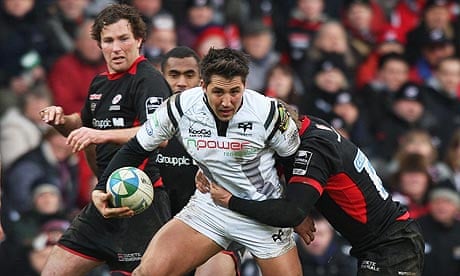When the Ospreys' squad for the Heineken Cup was announced late on Friday afternoon it caused barely a ripple even though the region's most celebrated player, Gavin Henson, was not among the 38 listed.
At 27, Henson should be in his prime. Instead, he is on a leave of absence, disillusioned, it is said, by a succession of injuries that have made his appearances on the field sporadic since Wales won the 2005 grand slam.
It seems more an excuse than an explanation. Henson's misfortune is little compared to that suffered by Jonny Wilkinson since England won the 2003 World Cup, But whereas Wilkinson was born to be a professional sportsman, devoting most of his waking hours to rugby, Henson is a freer spirit who gets his satisfaction out of playing rather than preparation or talking about the game.
The 27-year-old Welshman would have been more comfortable in the amateur era, when the game was part-time and the power of players was measured by the clout they had within a club rather than how many days a week they spent on the weights, even if he would have missed the money.
Socialising would not have been the issue it is today. He would have been judged on his playing, not on his audition for Strictly Come Dancing after gatecrashing a wedding bash.
Like Scott Gibbs, his former captain at Swansea and the Ospreys, Henson enjoys rugby but not what comes with it. Professional sides are tightly controlled: speaking to players, so easy in the amateur days when they could be approached at a bar, after a match or phoned at home, is strictly regulated and they are coached in what to say.
Henson, like Gibbs, who was once carpeted by Swansea after saying at the end of his first match after returning from rugby league that he had found the 80 minutes boring, gives his employers at regional and international level the jitters because he will answer a question honestly. And so Henson is very rarely made available to journalists, themselves a breed which has seen a weeding out of mavericks.
It is questionable whether the Ospreys are the right side for him. There is something joyless about the big-spending region which, befitting a team whose kit is splattered with the logos of various sponsors, seems to lack identity. They are hardly under-achievers having won the Magners League and the Powergen Cup in recent seasons, but for all their talent they reflect the way rugby has changed, proscriptive rather than reactive.
But where can a free spirit find a home? Ryan Lamb looks more at ease at London Irish than he did at Gloucester, Shane Geraghty has brought a touch of adventure to Northampton while Danny Cipriani, like Henson one of rugby union's few celebrities, is trying to regain his swagger with Wasps, whose style of play last season inhibited the outside-half.
Henson needs a change of scenery, but more than that, he needs a club and coach to invest time in him. He needs to feel not just appreciated but wanted. Scott Johnson discovered what makes Henson tick while he was Wales's assistant coach earlier this decade, but he had time on his side then. Now in charge of the Ospreys, he has his hands full elsewhere.
The game needs a coaching revolution. When the Harlequins wing Tom Williams gave his written evidence to an appeal committee during the Bloodgate affair, he contended that when a coach gave an order, a player had no choice but to obey. Attend any media conference before or after a game, and the word gameplan is invariably mentioned at least once.
Indeed, too many matches are blighted by fear, with players afraid to take risks or try something instinctive. Saracens have made a winning start under Brendan Venter, but there is a rigidity about them, as structured as any American football side.
You had to admire their resilience at Harlequins last Saturday as well as their application, but rugby should also be about individual expression. It is that mix of ugliness and beauty that over the years has made a complex game so fascinating, but as concessions have been made in recent years to broadcasters and sponsors to make the game more accessible, so some of its soul has been sold.
Henson is one of the victims. He may polarise opinion, but on song he is a player worth paying to watch. He just needs space in which to breathe.

Comments (…)
Sign in or create your Guardian account to join the discussion